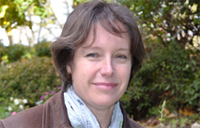
A pioneer in digital scholarship will give the inaugural lecture in the Knowledge Production in a Digital Age series presented by the York University Libraries.
Susan Brown, a professor of English at the University of Guelph and visiting professor at the University of Alberta, will give a lecture titled “Digital Humanities and Emergent Modes of Scholarly Production.” Brown’s talk will survey aspects of the digital humanities. She will discuss digital making of resources, prototypes and software as a mode of scholarship, on collaboration beyond co-authorship and on the role of infrastructure in changing modes of scholarly production in the digital age.
Brown’s lecture takes place Thursday, Nov. 13, from 1:30 to 3:30pm in the Scott Library Atrium, second floor. Light refreshments will be served.
“Susan Brown, as a pioneer in digital scholarship in Canada, brings her wide knowledge and experience in digital humanities to bear on a topic of importance to all engaged in the pursuit of research,” says Stacy Allison-Cassin, librarian and a member of the Scholarly Communications Initiative at York University. “We are thrilled to have her guide us through some of the current debates and challenges in digital humanities.”
Brown’s areas of research are Victorian literature, women’s writing and digital humanities (specifically interface design and usability), visualization and data mining, semantic technologies and humanist-centred tool development.
She is well known as the director of the successful Orlando Project: Women’s Writing in the British Isles from the Beginnings to the Present, an ongoing experiment in digital literary history published by Cambridge University Press since 2006. Through that project, Brown leveraged successful Canada Foundation for Innovation funding to launch the Canadian Writing Research Collaboratory in 2011 – a collaboration of researchers to produce an online repository and research environment for literary studies that are in and about Canada.
It is an exciting time for libraries and the digital humanities, says Allison-Cassin. The area of research, investigation and pedagogies that circulates under the rubric of the “digital humanities” covers a wide array of activities across a number of disciplines. “Digital scholarship has given rise to forms of scholarly production not traditionally collected by libraries and archives,” explains Allison-Cassin. “Websites, databases, software, digital installations and even tweets challenge us to consider the digital environment as a space not only for knowledge mobilization, but for collaborative knowledge production, challenging us to consider alternate modes of knowledge creation.”
This lecture is free and open to the public. All are welcome to attend.


